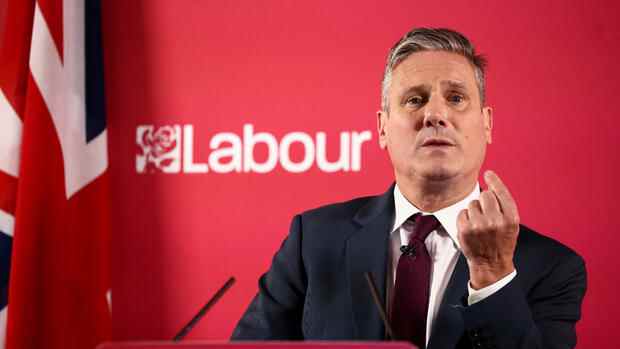The Labor leader wants to keep energy costs for consumers below £2000 a year.
(Photo: Reuters)
London British opposition leader Keir Starmer is back. After weeks of leaving the political arena to the two candidates for the leadership of the ruling Conservatives, Starmer is now proposing an energy price freeze to ease the “national emergency” of rising costs of living. “Millions of families can no longer afford the energy costs,” the 59-year-old explained his proposal.
Starmer wants to keep the cost to consumers under £2000 a year. “Our plan would save households £1000 this winter. At the same time we want to invest in sustainable British energy to lower bills in the long term,” said the Labor leader.
Gas and electricity costs in the UK are regulated by a government price cap for most households. However, this upper limit is repeatedly adjusted to the market situation.
As a result, energy costs for the average household are expected to rise to more than £3,500 a year by October 1st. That would be a 75 percent increase from previous levels. In January 2023, according to the forecast by the market experts at Cornwall Insight, there is a risk of another price surge to more than £4,200 (€4,970).
Top jobs of the day
Find the best jobs now and
be notified by email.
He also assumes that the inflation rate could be reduced by four percentage points as a result of the energy price freeze. The Bank of England recently predicted inflation would rise to more than 13 percent by October.
Expected costs in the billions
A price cap, which the opposition Liberal Democrats are also calling for, would benefit all households, regardless of their income. The International Monetary Fund (IMF), on the other hand, advocates concentrating state aid more specifically on low-income families and not intervening in the price mechanism.
Labor estimates the cost of the government intervention would be around £29bn by April 2023. In order not to drive the energy suppliers into financial ruin, Starmer’s plan envisages compensating for the difference between market prices and the state price ceiling. Almost 30 British energy companies have already had to file for bankruptcy in the course of the crisis.
Oil and gas producers already pay an excess profits tax in the UK.
(Photo: Reuters)
In order to cover the costs of the price freeze, the largest British opposition party wants, among other things, to tighten the windfall tax for oil and gas producers introduced by the Conservative government in the summer. In the future, investments in fossil fuels should no longer be able to reduce the additional tax. In addition, Labor wants to assert the “windfall tax” retrospectively as of January 1, 2022.
>>Read here: Record results at RWE, Shell and Co.: Support for excess profit tax is growing
Starmer dismissed fears that the excess profit tax could stifle investment and slow the energy transition towards sustainable fuels. “Even the bosses of the big energy companies see no effect on investments,” the politician claimed.
With his proposal, the opposition leader is putting the governing Tories under further pressure to act. According to a survey by the Yougov institute for the British daily newspaper The Times, a majority of conservative voters are also in favor of a price freeze.
Conservatives reject price freeze
Yet the current Conservative leader, British Foreign Secretary Liz Truss, refuses to tackle the energy crisis with direct financial aid, opting instead for tax cuts. Her rival Rishi Sunak, on the other hand, has proposed suspending VAT on energy and promised targeted support for the poorest households. However, both candidates reject a price freeze.
Companies are also under pressure. The government already has plans to extend the excess profit tax to electricity producers.
The British trade union confederation TUC even proposes nationalizing the energy sector. An idea shared by former British Labor Prime Minister Gordon Brown, at least for those companies that are unwilling or unable to lower their energy bills.
Brown had his advance over the weekend stole the “show” from Starmer, who was still on holiday, and generally blamed British politicians for preferring to sit on the beach rather than in the crisis center in the midst of the worst economic crisis in 50 years.
However, Starmer rejects nationalization. “That would only put money in the coffers of shareholders and would not help any budget,” argues the Labor leader. The social democrat is trying to leave the socialist ideas of his predecessor Jeremy Corbyn behind and to make Labor capable of winning a majority again in the rather conservative kingdom.
According to the latest polls, the opposition party is almost four percentage points ahead of the governing Tories in terms of voter support. In July, however, the lead was still a good ten percentage points.
More: Tied to the EU: British Conservatives have trouble explaining themselves about the energy crisis
